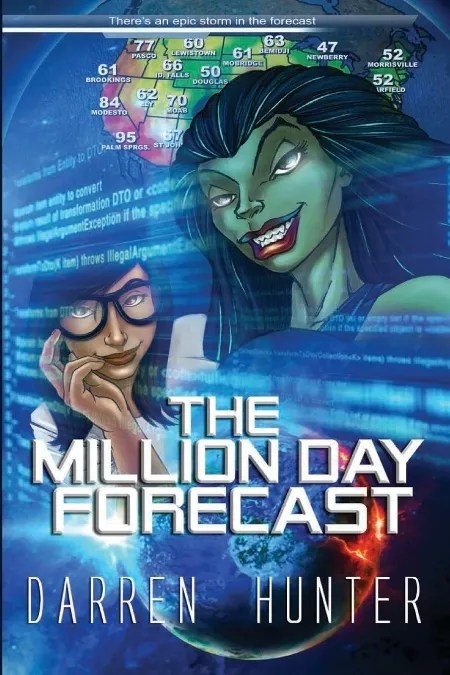
Netflix/@davidsirota

Audio By Carbonatix
David Sirota‘s professional focus is The Lever, a news website whose self-described goal is to hold “accountable the people and corporations manipulating the levers of power.” But the Denver-based journalist also made a name for himself by way of his co-story credit on Don’t Look Up, a 2021 film that became a smash on Netflix and garnered him an Academy Award nomination.
But now Don’t Look Up has earned a less prized honor: It’s the target of a December 5 lawsuit in which author Darren Hunter claims that Sirota and Oscar-winning director and writer Adam McKay, a Denver native, swiped much of their tale from The Million Day Forecast: There’s an Epic Storm in the Forecast, a book he wrote and originally self-published in 2015.
This is the second time a self-published author has maintained that Don’t Look Up ripped him off. In November, a suit from William Collier, who said Don’t Look Up stole many of its concepts from his 2012 novel Stanley’s Comet, was dismissed. But Larry Klayman, the attorney who’s pressing Hunter’s complaint in Florida’s 9th Judicial Circuit Court and just happens to be the founder of Freedom Watch and Judicial Watch, doesn’t believe this case will meet the same fate.
“There are too many similarities for coincidence,” he says of Don’t Look Up and The Million Day Forecast, “and a jury will conclude in our favor.”
The suit’s listed defendants are Sirota, McKay and his production company, Hyperobject Industries, plus Netflix and Scott Stuber, the firm’s chairperson and a Don’t Look Up co-producer. McKay hasn’t commented on Hunter’s assertions, and neither Netflix nor Sirota have responded to Westword‘s request for comment.
Back in 2021, however, Sirota detailed the birth of Don’t Look Up in this space.
“I’ve known Adam for a very long time, all the way back into the early George W. Bush administration,” he said. “He’s a politically aware, politically engaged person, and after his movie Vice [about ex-veep Dick Cheney] came out, we were discussing the climate crisis. I said to him, ‘You’ve got to use your superpowers to do some kind of climate movie, but it can’t be a Mad Max, post-apocalypse film. It’s got to be something that uses your comedic powers.'”
Added Sirota: “We were bouncing ideas around, and at one point, I said, ‘It’s really like an asteroid is headed toward Earth and no one seems to care.’ And he said, ‘Wait a minute. I think that could be the movie.’ So we spitballed it a little more, had fun with it, threw out some different ideas, and then he wrote the script. I gave him some notes, he polished it some more, and then he said, ‘We’re really going to do this.'”
Sirota’s reaction? “I didn’t eye-roll him, exactly, but I didn’t really believe it was going to happen. But then, all of a sudden, they’re sending me the paperwork.”

The cover of The Million Day Forecast: There’s an Epic Storm in the Forecast.
McKay’s screenplay attracted an extraordinary roster of on-screen talent. In the foreground are Jennifer Lawrence as Kate Dibiasky, a doctoral candidate in astronomy who discovers that a deadly asteroid is on its way, Leonardo DiCaprio as Dibiasky’s teacher and supporter, and Meryl Streep as the President of the United States. A-list players aplenty pop up in smaller roles, too – Cate Blanchett, Tyler Perry, Ariana Grande and Timothée Chalamet among them.
Don’t Look Up was released on December 8, 2021, and audiences swarmed to see it both in theaters and their living rooms. According to Box Office Mojo, the movie earned just over $791 million worldwide – an amount that inspired the Hunter lawsuit’s triple-damage demand of $2.4 billion. And last month, Netflix listed it as its second-most-successful film ever, notching 171.1 million views as of that time. Only 2021’s Red Notice, with Ryan Reynolds, the Rock and Gal Gadot, attracted more eyeballs.
The Million Day Forecast has made a much more modest impact: Amazon ranks it at 5,220,275th in overall book sales. But the lawsuit contends that in “2015 and 2017, Plaintiff distributed copies of his book to various individuals and entities within the entertainment industry, including representatives connected with each and every one of the Defendants. Thus, each and every one of the Defendants knew about the BOOK and its plot.”
The synopsis of The Million Day Forecast on its Amazon page describes it like so: “A 17 year old high school student named Emma Hayes is contacted by an alien named Srenyi from the galaxy Centauras A. He provides her information about a calamitous event set to befall earth in one million days. The revelation sets off a stunning chain of events on earth, resulting in an ordinary teenage girl finding herself forced into a heart-pounding race against time, and acceptance of the challenge to save the human race. Along the way there is a startling glimpse into what extra-terrestrials are like – or perhaps more terrifyingly, what humans are really like.”
This synopsis contains multiple elements absent from Don’t Look Up. But the lawsuit lists fourteen alleged likenesses in character, sequence and theme, as well as dozens of common “copyright elements.” Here are some examples of the latter from the document:

An excerpt from Hunter v. Netflix, et al.
Klayman declines to elaborate on the specifics of the 44-page lawsuit, saying that “the complaint speaks for itself.” But he’s got a lot of thoughts about a December 5 article in Variety about Hunter’s protestations over Don’t Look Up. He says he plans to sue over items such as a paragraph that reads, “Hunter’s author page on Amazon states that he decided to write Million Day Forecast ‘after being visited from a strange being who said they were from the galaxy Centaurus A.'” In the attorney’s view, “that’s defamation by implication. It was satire” – Variety updated its piece with a comment from Klayman to this effect – “but they created the impression that my client is communicating with aliens. They took a shot at him.”
He’s happy to fire back. “This case is a slam dunk to go to the jury,” he allows, “and the jury will have to make a decision.”
Click to read Hunter v. Netflix, et al.